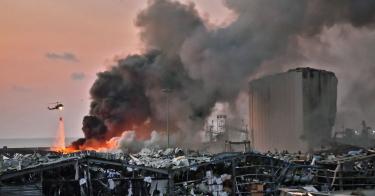As Lebanon continues to struggle in the aftermath of the August 4 Beirut explosion, one thing is clear: The cause of the blast needs to be fully investigated by a credible authority. It is clear that Lebanon’s dysfunctional government, mistrusted by its own people, does not have the capability or credibility to do so.
Lebanese Prime Minister Hassan Diab and his cabinet resigned August 10 under heavy pressure from massive protests in the aftermath of last week’s disastrous explosion in Beirut’s port.
The blast, attributed to 2,750 tons of ammonium nitrate that was stored in unsafe conditions, killed at least 172 people, injured 6,000, and destroyed an estimated 6,000 buildings, leaving up to 300,000 people homeless, according to municipal authorities.
Although the government quit, anti-government protesters have not.
Anti-government protests that began last October have only intensified after the explosion. The protesters maintain that their battle was not against one government, but the whole political system, which is dominated by sectarian parties led by corrupt politicians, many of them former warlords who rose to power during Lebanon’s civil war.
The August 4 Beirut disaster amplified widespread public anger against the dysfunctional and corruption-riddled political system that has failed to address Lebanon’s overlapping economic, political, humanitarian, and coronavirus-related public health crises.
Lebanon’s slide towards becoming a failed state is accelerating. Diab will remain in a caretaker capacity until a new prime minister is selected. But no new face is likely to satisfy the multi-sectarian protest movement, which seeks to bring down the oligarchs who feed off of Lebanon’s sectarian spoils system.
International Investigation Needed
Considerable evidence suggests that the Beirut blast was an accident waiting to happen due to the gross negligence of Lebanese authorities. This was compounded by the malign intentions of Hezbollah, the Iran-backed Shia Islamist extremist organization.
Hezbollah not only is the strongest faction within Lebanon’s coalition government, but it runs a state within the state and a port within the port.
Hezbollah long has smuggled imported goods, arms, and drugs through the port and has a longstanding interest in accumulating ammonium nitrate for building bombs as part of its terrorist campaign against Israel and other enemies.
Hezbollah caches of ammonium nitrate were discovered in Germany this year, and three tons were discovered in London by British security services in 2015.
Although the ammonium nitrate stocks, confiscated from a rusty cargo ship in Beirut in 2013, were stored in a warehouse technically controlled by the government, Hezbollah undoubtedly knew about its presence and probably was siphoning off some of it for its terrorism operations.
The official story is that a welding accident started a fire which ignited “fireworks” in one warehouse that triggered the explosion of the ammonium nitrate in a separate warehouse. But there was no airborne display of sparkling explosions or whistling sounds common to fireworks.
It is likely that Hezbollah munitions covertly stored in the “Fatima Gate”–Hezbollah’s clandestine port within the port—caused the first explosion, not fireworks. But it remains unclear what set off the initial fire and the first explosion.
The Lebanese government has put port officials under house arrest and appears to be set on using them as convenient scapegoats to protect Hezbollah. But port officials leaked letters showing that they had repeatedly requested that the justice ministry authorize the movement of the dangerous chemicals away from the port, without receiving any answers.
Now, officials from that same ministry are involved in the investigation, an obvious conflict of interests.
An investigation by Reuters disclosed that port and security officials warned the prime minister and president repeatedly about the dangers of the materials in the port, as late as last month two weeks before the blast.
Former Lebanese Justice Minister Ashraf Rifi warned that investigators should receive strong government protection because Hezbollah was responsible for assassinating former Lebanese Prime Minister Rafik Al Hariri in 2005 and at least two Lebanese military officials.
The United Nations was set to announce the verdict reached by a U.N. Special Tribunal on the involvement of four Hezbollah members in Hariri’s assassination, but postponed the announcement due to the blast.
Hezbollah’s expanding influence as the power behind the throne of Lebanon’s coalition government precluded an objective investigation of the Hariri assassination by Lebanese authorities, and the Beirut disaster also should be handled by some form of an international investigation.
The head of Lebanon’s most powerful security agency, which will be involved in the country’s investigation, is a close ally of Hezbollah.
An international aid conference organized by France raised $300 million in pledges for humanitarian aid from countries and international organizations on Sunday, but will disburse the money directly to transparent Lebanese and other organizations without funneling it through the corrupt government.
Hezbollah: The Elephant in the Room
If there is a silver lining in the Beirut mushroom cloud, it is that the disaster has more fully focused international attention on Hezbollah’s malign influence within Lebanon.
In addition to the pending announcement by the U.N. Special Tribunal, the U.N. has grown more assertive in criticizing Hezbollah for its failure to abide by U.N. Security Council Resolution 1701, which called for the disarming of all Lebanese militias outside the government’s control.
U.N. Secretary-General António Guterres called on the Lebanese government to disarm the Hezbollah in a report released last week. He also criticized the group for interfering with the operations of the United Nations Interim Force in Lebanon, a peacekeeping force that has been deployed in southern Lebanon since 1978.
The United States currently is pushing for a stronger mandate for the United Nations Interim Force in Lebanon at the Security Council. Such action is long overdue. It is a necessary but not a sufficient prerequisite for whittling down Hezbollah’s power in southern Lebanon. Unfortunately, as long as Hezbollah dominates the Lebanese government, Lebanon’s protracted crisis will grow increasingly grim.
This piece originally appeared in The Daily Signal



